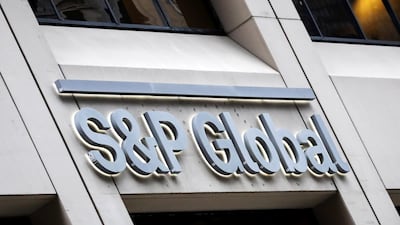S&P Global agreed to buy IHS Markit for about $39 billion in stock, a deal that accelerates the wave of consolidation among Wall Street’s biggest data providers.
S&P is offering 0.2838 shares for each IHS Markit share, according to a statement Monday. That represents about a 4.7 per cent premium to IHS Markit’s last close, according to Bloomberg calculations. After the deal, S&P shareholders will own approximately 67.75 per cent of the combined company on a fully diluted basis.
Douglas Peterson, chief executive officer of S&P, will serve as chief executive of the combined company. Lance Uggla, chief executive of IHS Markit, will stay on as a special advisor to the company for one year after the deal is closed.
The acquisition has an enterprise value of about $44bn, including the assumption of $4.8bn in net debt.
The proposed tie-up of S&P with IHS Markit, a research firm with more than 5,000 analysts, data scientists, financial experts and industry specialists, is part of a race for scale as the industry’s largest players try to capitalise on surging demand for data and analytics in increasingly computerised financial markets. This follows London Stock Exchange Group’s $27bn agreement last year to acquire Refinitiv.
Shares of S&P Global, IHS Markit and rivals including MSCI have soared in recent years, providing ample currency for deal-making.
“This is a huge consolidation of financial databases and services,” said Gary Dugan, chief executive of the Global CIO Office, an investment firm in Singapore. “S&P probably gathered that expansion incrementally wouldn’t work and instead has gone for a major acquisition, which will deepen their product range and relevance.”
Bloomberg LP, the parent of Bloomberg News, competes with IHS Markit and S&P Global in providing financial analytics and information.
The deal would be the world’s second-largest acquisition of 2020, second only to the $56bn set of transactions among China’s biggest oil and gas companies to sell their pipeline networks to a new national carrier, according to data compiled by Bloomberg.
Markit was famously founded in a UK barn by Uggla, a Canadian who spotted an opportunity to provide pricing for the opaque world of credit default swaps just as trading of the derivatives was taking off in the early 2000s.
Regulatory scrutiny could pose one risk for the tie-up, given the overlap between the firms’ data offerings, according to Craig A. Huber, founder of Huber Research Partners.
The LSE is still negotiating with European Union regulators over its deal for Refinitiv, with competition authorities expressing concerns over how some companies’ control of data can make them gatekeepers for an industry.
“Antitrust could be an issue since both are market data providers,” said Jin Rui Oh, director at United First Partners, an investment and advisory group that specialises in special situations. “That could be a little tricky.”

